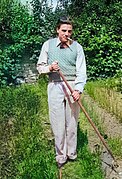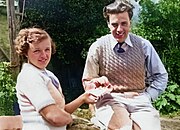| Medal record | ||
|---|---|---|
| Women's Athletics | ||
| Representing | ||
| Women's World Games |
Mark Edward Louis Weston (born Mary Edith Louise Weston, 30 March 1905 – 29 January 1978), nicknamed "the Devonshire Wonder", was one of the best British field athletes in women's competitions during the 1920s. He was a national champion in the women's javelin throw and discus throw in 1929 and won the women's shot put title in 1925, 1928 and 1929. At the 1926 Women's World Games, he finished sixth in the two-handed shot put, where the final result was a sum of two best throws with the right hand and with the left hand. Weston was born with atypical genitals due to a disorder of sex development (DSD), was assigned female at birth and raised as a girl. In April and May 1936, Weston underwent a series of corrective surgeries at the Charing Cross Hospital.
Born in Oreston, Weston worked in a clothing factory after leaving school and then as a nurse, which lead to him pursuing a career in massage and earning a diploma. He became interested in amateur athletics in 1924, taking part until 1930. Weston explained in an interview that his studies into anatomy led to him questioning his gender in 1930.
After surgery, Weston changed his first name to Mark, retired from competitions, and returned to work as a masseur. In July 1936, Weston married Alberta Matilda Bray, and they had three children.
Following his example, his elder sibling Harry (previously known as Hilda) also changed his gender presentation and name in the 1930s. Harry died by suicide by hanging while suffering from depression in 1942.
Weston died in the Freedom Fields Hospital in Plymouth in 1978.
Gallery
-
 Weston in 1936 (colorized)
Weston in 1936 (colorized)
-
 Weston with his wife Alberta Matilda Bray in 1936 (colorized)
Weston with his wife Alberta Matilda Bray in 1936 (colorized)
-
 Weston with his wife and a friend in 1936 (colorized)
Weston with his wife and a friend in 1936 (colorized)
See also
References
- Bronner, Milton (19 August 1936). "The "Girl-Who-Became-a-Bridegroom" Tells How It Feels to Change". Lancaster New Era.
- BRITISH ATHLETICS CHAMPIONSHIPS 1919–1939. gbrathletics.com
- FSFI WOMEN'S WORLD GAMES. gbrathletics.com
- ^ Watman, Mel. "Women athletes between the world wars (act. 1919–1939)." Oxford Dictionary of National Biography. Online ed. Ed. Lawrence Goldman. Oxford: OUP, May 2012.
- ^ "Girl Who Became Man Tells of Metamorphosis". Reading Eagle. 28 May 1936
- ^ Heggie, V. (2010). "Testing sex and gender in sports; reinventing, reimagining and reconstructing histories". Endeavour. 34 (4): 157–63. doi:10.1016/j.endeavour.2010.09.005. PMC 3007680. PMID 20980057.
- Erikainen, Sonja (2020). "The Story of Mark Weston: Re-centring Histories and Conceptualising Gender Variance in 1930s International Sport" (PDF). Gender & History. 32 (2): 304–319. doi:10.1111/1468-0424.12474.
- Bronner, Milton (7 September 1936). "The Girl Who Became a Bridgegroom". Athens Banner-Herald. Newspaper Enterprise Association. p. 8 – via Georgia Historic Newspapers. Earlier published in The Owozzo Argus-Press according to Erikainen.
- 1905 births
- British female shot putters
- British female discus throwers
- British female javelin throwers
- LGBTQ track and field athletes
- Sex verification in sports
- 1978 deaths
- Intersex sportspeople
- Transgender sportsmen
- British intersex men
- English transgender sportspeople
- English transgender men
- 20th-century English LGBTQ people
- Intersex transgender men
- Sportspeople from Plymouth, Devon